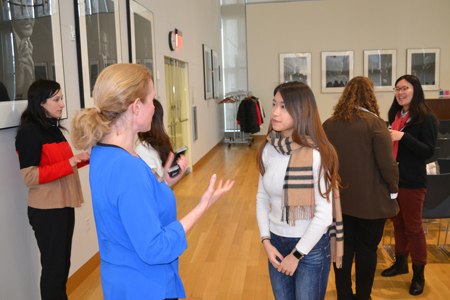Total Immersion and Professional Networking in Banking, American Law
Students are strongly encouraged to expand their professional networks within the LLM program at BU Law.

Across BU Law’s LLM programs, developing legal knowledge and skills are a core part of students’ experiences—but not the only part. Expanding one’s professional networks is vital as well, and can bring immeasurable, long-term value to the overall experience. No one knows this better than Rebecca Moor, BU Law’s associate director for professional development at the Graduate & International Programs Office.
Part of Moor’s mission is to orchestrate the broad array of programming—outside speakers, workshops, industry presentations, panel discussions, alumni advising sessions, and field visits—that immerse students in settings designed to expand their professional networks and connections. Typically, when Moor first sits down with a student, she helps him or her build a list of professional connections that he or she can begin contacting. Many students send her drafts of introductory emails. “This is welcome and expected,” says Moor. “US-style networking is a foreign concept to many of our foreign students, and they can feel fairly awkward initiating contact with a stranger for career purposes.” She strives to help students understand that networking serves a purpose beyond job placement. It allows them to establish relationships with future clients, strengthen existing connections, and gain advice from professionals whose careers they hope to emulate.
Moor often draws from her own experiences to illustrate to students how important a professional network is to identify and seize job opportunities in many legal fields. “I have a JD from Columbia University and an LLM from The University of Nottingham, and I have work experience at big law firms and as a career advisor in legal education. But when I showed up in Boston, no employers would return my calls or get back to me about the jobs I applied for,” she recalls. Only after Moor reached out to her well-established networks was she able to connect and meet with professionals in Boston that would eventually lead her to a job. “I tell students that everyone who is new to a city has to network, no matter what your credentials are or how much experience you have,” says Moor.
Students are encouraged to attend industry specific meetings of the Boston Bar Association, American Bar Association and Massachusetts Bar Association, to which Boston University School of Law LLM students have free memberships. Attending such events are essential for growing one’s professional networks and meeting practitioners immersed in their fields of interest.
Other practical training opportunities are available for students within their specific LLM programs. The Graduate Program in Banking & Financial Law, for example, arranges for students to attend industry conferences, notes Lorraine Kaplan, the program’s assistant director. “We expose students to professional opportunities in the way of conferences and meetings as a means for them to network with financial services compliance professionals. It’s part of our ‘total immersion in banking’ approach.”
Typically, up to ten students from the Banking & Financial Law students go to the Fundamentals of Banking Law Conference, held in June each year. “This year, we are funding the students’ attendance with a scholarship on behalf of the late Kathleen O’Day, who taught the International Banking session of the Fundamentals of Banking Law Program each year,” says Kaplan, adding that BU Law students have always been welcome to attend the program’s academic and networking sessions.
Another ten students attend the Fundamentals in Financial Compliance Conference, held in October each year. Fortunately, Boston University School of Law serves as a co-sponsor and host for both conferences, lending the opportunity to invite LLM students to participate in conference events and professional networking with financial law compliance professionals.
Kurnia Rahmani (LLM in Banking & Financial Law ’18), who worked as a compliance advisor in her home country of Indonesia, attended the most recent Fundamentals in Financial Compliance Conference and met with other compliance professionals. “We exchanged our experiences, and discussed what our greatest challenges were in working in the compliance industry, of which I had learned to understand from my past experience working in financial compliance.”
Professionals in financial compliance attend the October conference to stay up-to-date in their field and to gain applicable training relevant to the designation of Certified Regulatory Compliance Manager by the Institute of Certified Bankers. Students in the Banking & Financial Law Program gain these credentials when they attend the conference.
“The conference not only taught me what we can improve on after financial crisis, but how to identify some of the key challenges in Asset Management Compliance after the crisis, says Rahmani. “It was a valuable experience to learn and also network.”